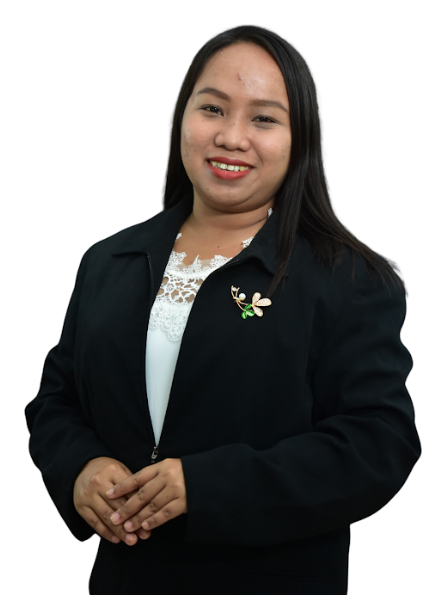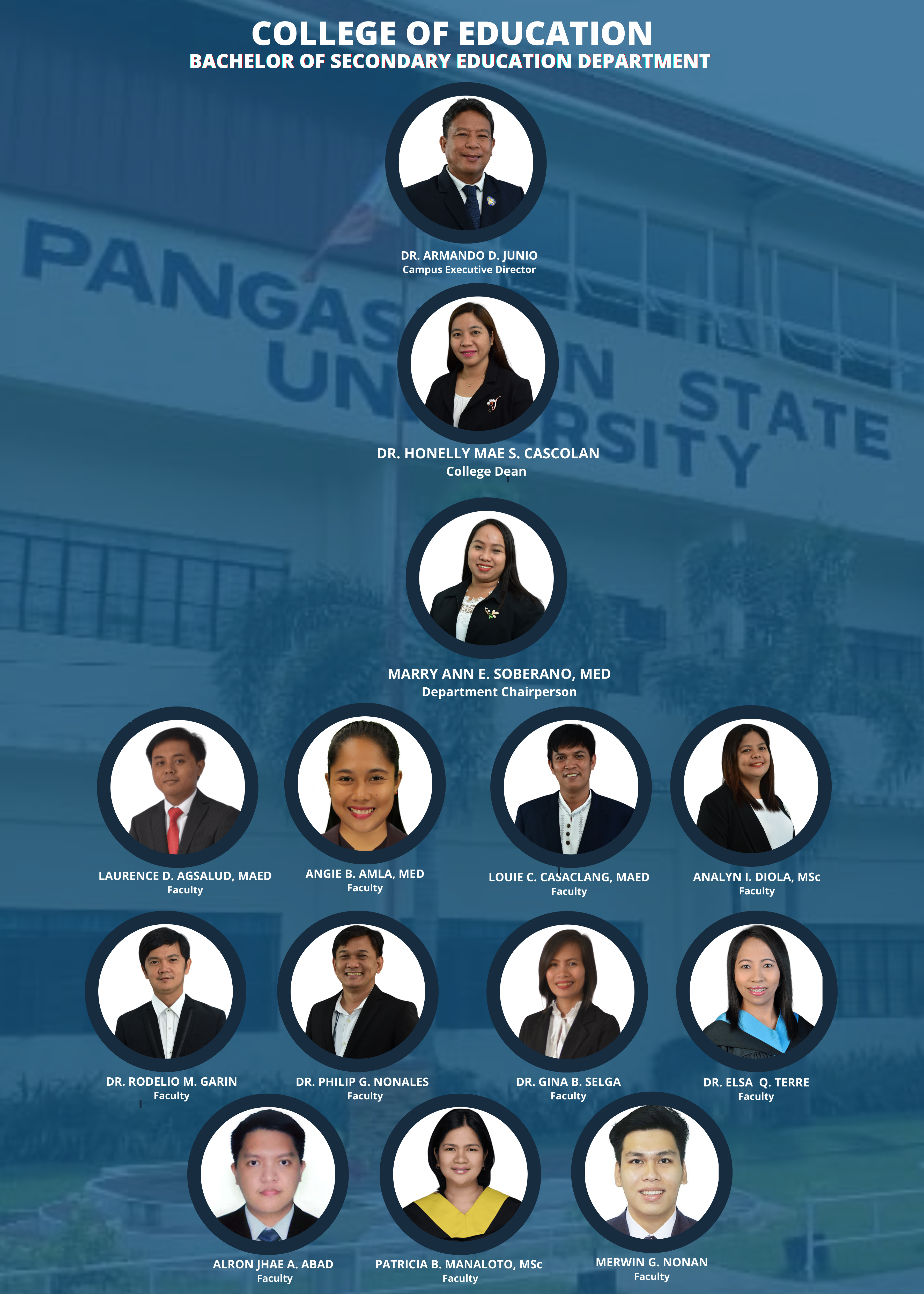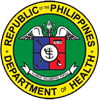
Welcome to the BSEd Department!
Good day! The BSE and BTLEd Department is exhilarated to welcome you to the Pangasinan State University- Asingan campus webpage where numerous information about our institution is found. We are delighted to know you are interested to learn about our campus such as our course offerings and other easily accessible activities. Have the time to grasp and be inspired thru browsing our webpage.
The Pangasinan State University-Asingan Campus adheres with the value that aims students to become inspired and be passionately driven with their quest to finish their studies. It also assures to produce caliber graduates who can keep pace with the fast-changing society. This is possible because the PSU-Asingan campus offers excellent services to students and guarantees quality education by employing experts in the field of teaching and allied fields.
As the saying goes “If you want to achieve success in life, you should have courage and determination in yourself”, with that, the PSU-Asingan Campus family will help you achieve your goals in life, will teach you to have courage and determination to finish your studies, and will provide you with many opportunities that you can choose from in order for you to become the best way you can be.
MARRY ANN E. SOBERANO, M. Ed.
Department Chair
Program Description
The Bachelor of Secondary Education major in English is an undergraduate teacher education program designed to equip teachers with adequate and relevant competencies to teach English in the secondary level.
The Bachelor of Secondary Education major in Mathematics is an undergraduate teacher education program designed to equip teachers with adequate and relevant competencies to teach Mathematics in the secondary level.
The BSEd Science is an undergraduate teacher education program designed to equip teachers with adequate and relevant competencies to teach Science in the secondary level.
The BSEd Science program draws from various allied disciplines like social sciences, science, math, technology, languages, and humanities to ensure that the graduates have a multi-disciplinary preparation in content and pedagogy.
Program Objectives
The intent of the BSED English program is to produce teachers who are able to meet the demands of the teaching profession, both local and national area and in the ASEAN region. It has the following objectives: (BSED English 2021 Curriculum with CHED Contents Notation)
- Demonstrate through institutional mechanisms, systems, policies, and processes which are reflective of transparency, equity, participatory decision making, and accountability;
- Engage in relevant, comprehensive and sustainable development initiatives through multiple perspectives in decisions and actions that build personal and professional credibility and integrity.
- Set challenging goals and tasks with determination and sense of urgency which provide continuous improvement and producing quality outputs leading to inclusive growth;
- Exhibit life-long learning and global competency proficiency in communication skills, inter/interpersonal skills, entrepreneurial skills, innovative mindset, research and production initiatives and capability in meeting the industry requirements of local, ASEAN and international human capital market through relevant and comprehensive programs;
- Display, socially and environmentally responsive organizational culture, which ensures higher productivity among the university constituents and elevate the welfare of the multi-sectoral communities and;
- Practice spiritual values and morally upright behavior which promote and inspire greater harmony to project a credible public image.
The intent of the BSED Mathematics program is to produce teachers who are able to meet the demands of the teaching profession, both local and national area and in the ASEAN region. It has the following objectives: (BSED Mathematics 2021 Curriculum with CHED Contents Notation)
- Demonstrate through institutional mechanisms, systems, policies, and processes which are reflective of transparency, equity, participatory decision making, and accountability;
- Engage in relevant, comprehensive and sustainable development initiatives through multiple perspectives in decisions and actions that build personal and professional credibility and integrity.
- Set challenging goals and tasks with determination and sense of urgency which provide continuous improvement and producing quality outputs leading to inclusive growth;
- Exhibit life-long learning and global competency proficiency in communication skills, inter/interpersonal skills, entrepreneurial skills, innovative mindset, research and production initiatives and capability in meeting the industry requirements of local, ASEAN and international human capital market through relevant and comprehensive programs;
- Display, socially and environmentally responsive organizational culture, which ensures higher productivity among the university constituents and elevate the welfare of the multi-sectoral communities and;
- Practice spiritual values and morally upright behavior which promote and inspire greater harmony to project a credible public image.
The intent of the BSED Science program is to produce teachers who are able to meet the demands of the teaching profession, both local and national area and in the ASEAN region. It has the following objectives: (BSED Science 2021 Curriculum with CHED Contents Notation)
- Demonstrate through institutional mechanisms, systems, policies, and processes which are reflective of transparency, equity, participatory decision making, and accountability;
- Engage in relevant, comprehensive and sustainable development initiatives through multiple perspectives in decisions and actions that build personal and professional credibility and integrity.
- Set challenging goals and tasks with determination and sense of urgency which provide continuous improvement and producing quality outputs leading to inclusive growth;
- Exhibit life-long learning and global competency proficiency in communication skills, inter/interpersonal skills, entrepreneurial skills, innovative mindset, research and production initiatives and capability in meeting the industry requirements of local, ASEAN and international human capital market through relevant and comprehensive programs;
- Display, socially and environmentally responsive organizational culture, which ensures higher productivity among the university constituents and elevate the welfare of the multi-sectoral communities and;
- Practice spiritual values and morally upright behavior which promote and inspire greater harmony to project a credible public image.
Organizational Chart

EMPLOYMENT OPPORTUNITIES
|
|
|
Program Outcomes
|
GRADUATE ATTRIBUTES |
PROGRAM OUTCOMES |
PERFORMANCE INDICATORS |
|
People’s Champion |
PO1. Demonstrate through institutional mechanisms, system, policies, and processes which are reflective of transparency, equity, participatory decision making, and accountability. PO2. Engage in relevant, comprehensive, and sustainable development initiatives through multiple perspectives in decisions and actions that build personal and professional credibility and integrity. PO3. Set challenging goals and tasks with determination and sense of urgency which provide continuous improvement and producing quality outputs leading to inclusive growth. PO4. Exhibit life-long learning and global competence proficiency in communication skills, intra/interpersonal skills, entrepreneurial skills, innovative mindset, research and production initiatives and capability in meeting industry requirements of local, ASEAN and international human capital market through relevant and comprehensive programs. PO5. Display, socially and environmentally responsive organizational culture, which ensures higher productivity among the university constituents and elevate the welfare of the multi-sectoral communities. PO6. Practice spiritual values and morally upright behavior which promote and inspire greater harmony to project a credible public image. PO7. Articulate and discuss the latest development in the specific field of practice. PO9. Work effectively and independently in multi-disciplinary and multi-cultural teams PO10. Act in recognition of professional, social, and ethical responsibility. PO12 Articulate the rootedness of education in philosophical, socio-cultural, historical, psychological, and political contexts. PO18. Practice professional and ethical teaching standards sensitive to the changing local, national, and global realities. PO26. Inspire students and colleagues to lead relevant and transformative changes to improve learning and teaching language and literature. |
|
|
Continuous-Innovative Learner |
PO3. Set challenging goals and tasks with determination and sense of urgency which provide continuous improvement and producing quality outputs leading to inclusive growth. PO4. Exhibit life-long learning and global competence proficiency in communication skills, inter/interpersonal skills, entrepreneurial skills, innovative mindset, research and production initiatives and capability in meeting industry requirements of local, ASEAN and international human capital market through relevant and comprehensive programs. PO8. Effectively communicate orally and in writing using both Mother Tongue and English and Filipino PO13. Demonstrate mastery of subject matter/discipline. PO14. Facilitate learning using a wide-range of teaching methodologies and delivery modes appropriate to specific learners and their environments. PO15. Develop innovative curricula, instructional plans, teaching approaches, and resources for diverse learners. PO16. Apply skills in the development and utilization of ICT to promote quality, relevant, and sustainable educational practices. PO17. Demonstrate a variety of thinking skills in planning, monitoring, assessing, and reporting learning processes and outcomes. PO19. Pursue lifelong learning for personal and professional growth through varied experiential and field-based opportunities. PO20. Possess broad knowledge of language and literature for effective learning. PO21. Use English as a glocal language in multilingual context as it applies to the teaching of language and literature. PO22. Acquire extensive reading background in language, literature, and allied fields. PO23. Demonstrate proficiency in oral and written communication. PO24. Show competence in employing innovative language and literature teaching approaches, methodologies, and strategies. PO25. Use technology in facilitating language learning and teaching PO27. Display skills and abilities to be a reflective and research-oriented language and literature teacher. PO28. Contribute to the generation of new knowledge by participating in various research and development projects. |
|
|
Community Developer |
PO5. Display, socially and environmentally responsive organizational culture, which ensures higher productivity among the university constituents and elevate the welfare of the multi-sectoral communities. PO6. Practice spiritual values and morally upright behavior which promote and inspire greater harmony to project a credible public image. PO11. Preserve and promote “Filipino historical and cultural heritage” |
|
|
Graduate Attributes |
Program Outcomes |
Performance Indicators |
|
Exhibit competence in mathematical concepts and procedures. (SM1 ) Demonstrate mastery of subject matter/discipline. (CD2) Articulate and discuss the latest development in the specific field of practice. (CTS-1) |
Explain and illustrate clearly, accurately, and comprehensively the basic mathematical concepts using relevant examples as needed. |
|
|
Exhibit competence in mathematical concepts and procedures. (SM1 ) Demonstrate mastery of subject matter/discipline. (CD2) Articulate and discuss the latest development in the specific field of practice. (CTS-1) |
Demonstrate in detail basic mathematical procedures |
|
|
Exhibit competence in mathematical concepts and procedures. (SM1 ) Demonstrate mastery of subject matter/discipline. (CD2) Articulate and discuss the latest development in the specific field of practice. (CTS-1) |
Show the connections between mathematical concepts that are related to one another |
|
|
Exhibit competence in mathematical concepts and procedures. (PO ) Demonstrate mastery of subject matter/discipline. (CD 2) Articulate and discuss the latest development in the specific field of practice. (CTS-1) |
Provide examples to illustrate the application of mathematical concepts and procedures. |
|
|
Exhibit proficiency in relating mathematics to other curricular areas.(SM2) Develop innovative curricula, instructional plans, teaching approaches, and resources for diverse learners. (CD4) Demonstrate a variety of thinking skills in planning, monitoring, assessing, and reporting learning processes and outcomes. (CD 6) |
Create a curriculum guide that shows how mathematics can be integrated with other curricular areas. |
|
|
Exhibit proficiency in relating mathematics to other curricular areas. (SM 2) Develop innovative curricula, instructional plans, teaching approaches, and resources for diverse learners. (CD 4) Demonstrate a variety of thinking skills in planning, monitoring, assessing, and reporting learning processes and outcomes. (CD 6) |
Identify teaching activities which support the implementation of the curriculum guide. |
|
|
Exhibit proficiency in relating mathematics to other curricular areas. (SM 2) Develop innovative curricula, instructional plans, teaching approaches, and resources for diverse learners. (CD 4) Demonstrate a variety of thinking skills in planning, monitoring, assessing, and reporting learning processes and outcomes. (CD 6) |
Develop and utilize instructional materials that support the integration of mathematics with other curricular areas. |
|
|
Exhibit proficiency in relating mathematics to other curricular areas. (SM 2) Develop innovative curricula, instructional plans, teaching approaches, and resources for diverse learners. (CD 4) Apply skills in the development and utilization of ICT to promote quality, relevant, and sustainable educational practices. (CD 5) Demonstrate a variety of thinking skills in planning, monitoring, assessing, and reporting learning processes and outcomes. (CD 6) |
Utilize appropriate technologies to achieve learning outcomes. |
|
|
Manifest meaningful and comprehensive pedagogical content knowledge (PCK) of mathematics (SM 3) Demonstrate a variety of thinking skills in planning, monitoring, assessing, and reporting learning processes and outcomes. (CD 6) Engage in relevant, comprehensive, and sustainable development initiatives through multiple perspectives in decisions and actions that build personal and professional credibility and integrity. (ILO-2) Set challenging goals and tasks with determination and sense of urgency which provide continuous improvement and producing quality outputs leading to inclusive growth. (ILO-3) Exhibit life-long learning and global competence proficiency in communication skills, intra/interpersonal skills, entrepreneurial skills, innovative mindset, research and production initiatives and capability in meeting industry requirements of local, ASEAN and international human capital market through relevant and comprehensive programs. (ILO-4) Articulate and discuss the latest development in the specific field of practice. (CTS-1) Work effectively and independently in multi-disciplinary and multi-cultural teams (CTS-3) Contribute to the generation of new knowledge by participating in various research and development projects. (CHT 1) |
Demonstrate skills in various methods of learning in mathematics such as conducting investigations, modelling, and doing research. |
|
|
Manifest meaningful and comprehensive pedagogical content knowledge (PCK) of mathematics. (SM 3) Demonstrate a variety of thinking skills in planning, monitoring, assessing, and reporting learning processes and outcomes. (CD 6) Engage in relevant, comprehensive, and sustainable development initiatives through multiple perspectives in decisions and actions that build personal and professional credibility and integrity. (ILO-2) Set challenging goals and tasks with determination and sense of urgency which provide continuous improvement and producing quality outputs leading to inclusive growth. (ILO-3) Exhibit life-long learning and global competence proficiency in communication skills, intra/interpersonal skills, entrepreneurial skills, innovative mindset, research and production initiatives and capability in meeting industry requirements of local, ASEAN and international human capital market through relevant and comprehensive programs. (ILO-4) Articulate and discuss the latest development in the specific field of practice. (CTS-1) Work effectively and independently in multi-disciplinary and multi-cultural teams (CTS-3) |
Create and utilize learning experiences in the classroom which develop the learners’ skills in discovery learning, problem solving, and critical thinking. |
|
|
Demonstrate competence in designing, constructing, and utilizing different forms of assessment in mathematics. (SM 4) Demonstrate a variety of thinking skills in planning, monitoring, assessing, and reporting learning processes and outcomes. (CD 6) |
Design and utilize varied assessment tools in mathematics, including alternative forms of assessment. |
|
|
Demonstrate competence in designing, constructing, and utilizing different forms of assessment in mathematics. (SM 4) Demonstrate a variety of thinking skills in planning, monitoring, assessing, and reporting learning processes and outcomes. (CD 6) |
Analyze assessment results and use these to improve learning and teaching. |
|
|
Demonstrate competence in designing, constructing, and utilizing different forms of assessment in mathematics. (SM 4) Demonstrate a variety of thinking skills in planning, monitoring, assessing, and reporting learning processes and outcomes. (CD 6) |
Provide timely feedback of assessment results to students. |
|
|
Demonstrate proficiency in problem-solving by solving and creating routine and non-routine problems with different levels of complexity. (SM 5) Demonstrate mastery of subject matter/discipline. (CD-2) Facilitate learning using a wide range of teaching methodologies and delivery modes appropriate to specific learners and their environments. (CD-3) |
Demonstrate skills in various problem solving heuristics. |
|
|
Demonstrate proficiency in problem-solving by solving and creating routine and non-routine problems with different levels of complexity. (SM 5) Demonstrate mastery of subject matter/discipline. (CD-2) Facilitate learning using a wide range of teaching methodologies and delivery modes appropriate to specific learners and their environments. (CD-3) |
Select suitable examples to explain the various problem solving heuristics |
|
|
Demonstrate proficiency in problem-solving by solving and creating routine and non-routine problems with different levels of complexity. (SM 5) Demonstrate mastery of subject matter/discipline. (CD-2) Facilitate learning using a wide range of teaching methodologies and delivery modes appropriate to specific learners and their environments. (CD-3) |
Manifest creativity and critical thinking when selecting examples and problems to be used in the classroom and in the assessment of students learning. |
|
|
Demonstrate proficiency in problem-solving by solving and creating routine and non-routine problems with different levels of complexity. (SM 5) Demonstrate mastery of subject matter/discipline. (CD-2) Facilitate learning using a wide range of teaching methodologies and delivery modes appropriate to specific learners and their environments. (CD-3) |
Use varied resources for selecting and creating problems to develop the students’ problem solving skills. |
|
|
Use effectively appropriate approaches, methods, and techniques in teaching mathematics. (SM 6) Engage in relevant, comprehensive, and sustainable development initiatives through multiple perspectives in decisions and actions that build personal and professional credibility and integrity. (ILO-2) Set challenging goals and tasks with determination and sense of urgency which provide continuous improvement and producing quality outputs leading to inclusive growth. (ILO-3) Demonstrate a variety of thinking skills in planning, monitoring, assessing, and reporting learning processes and outcomes. (CD 6) Facilitate learning using a wide range of teaching methodologies and delivery modes appropriate to specific learners and their environments. (CD-3) |
Demonstrate knowledge and skills in varied approaches and methods of teaching mathematics. |
|
|
Use effectively appropriate approaches, methods, and techniques in teaching mathematics. (SM 6) Engage in relevant, comprehensive, and sustainable development initiatives through multiple perspectives in decisions and actions that build personal and professional credibility and integrity. (ILO-2) Set challenging goals and tasks with determination and sense of urgency which provide continuous improvement and producing quality outputs leading to inclusive growth. (ILO-3) Demonstrate a variety of thinking skills in planning, monitoring, assessing, and reporting learning processes and outcomes. (CD 6) Facilitate learning using a wide range of teaching methodologies and delivery modes appropriate to specific learners and their environments. (CD-3) |
Manifest discretion when selecting approaches or methods that would be effective in teaching particular lessons |
|
|
Use effectively appropriate approaches, methods, and techniques in teaching mathematics. (SM 6) Engage in relevant, comprehensive, and sustainable development initiatives through multiple perspectives in decisions and actions that build personal and professional credibility and integrity. (ILO-2) Set challenging goals and tasks with determination and sense of urgency which provide continuous improvement and producing quality outputs leading to inclusive growth. (ILO-3) Demonstrate a variety of thinking skills in planning, monitoring, assessing, and reporting learning processes and outcomes. (PO 17) Facilitate learning using a wide range of teaching methodologies and delivery modes appropriate to specific learners and their environments. (CD-3) |
Utilize a variety of student centered approaches and methods in the classroom. |
|
|
Use effectively appropriate approaches, methods, and techniques in teaching mathematics. (SM 6) Facilitate learning using a wide range of teaching methodologies and delivery modes appropriate to specific learners and their environments. (CD-3) Demonstrate a variety of thinking skills in planning, monitoring, assessing, and reporting learning processes and outcomes. (CD 6) |
Demonstrate skills in the use of common mathematical software for teaching and learning mathematical concepts, e.g. Graphmatica, Geogebra and Geometers Sketchpad |
|
|
Use effectively appropriate approaches, methods, and techniques in teaching mathematics. (SM 6) Facilitate learning using a wide range of teaching methodologies and delivery modes appropriate to specific learners and their environments. (CD-3) Demonstrate a variety of thinking skills in planning, monitoring, assessing, and reporting learning processes and outcomes. (CD 6) |
Develop and use materials that guide the students in using a mathematical software for discovering and learning mathematical concepts |
|
|
Appreciate mathematics as an opportunity for creative work, moments of discovery, and gaining insights of the world. Articulate the rootedness of education in philosophical, socio-cultural, historical, psychological, and political contexts. (CD-1) Display, socially and environmentally responsive organizational culture, which ensures higher productivity among the university constituents and elevate the welfare of the multi-sectoral communities. (ILO-5) |
Model in class such mathematical attitudes as delight after having found the solution to a problem or a sense of wonder at how certain mathematical concepts evolved. |
|
|
Appreciate mathematics as an opportunity for creative work, moments of discovery, and gaining insights of the world. Articulate the rootedness of education in philosophical, socio-cultural, historical, psychological, and political contexts. (CD-1) Display, socially and environmentally responsive organizational culture, which ensures higher productivity among the university constituents and elevate the welfare of the multi-sectoral communities. (ILO-5) Demonstrate a variety of thinking skills in planning, monitoring, assessing, and reporting learning processes and outcomes. (PO 17) Act in recognition of professional, social, and ethical responsibility. (CTS-4) |
Develop lessons than can help students appreciate the use of mathematics in daily life. |
|
Graduate Attributes |
PROGRAM OUTCOMES |
PERFOMANCE INDICATORS |
|
People’s Champion |
Demonstrate through institutional mechanisms, system, policies, and processes which are reflective of transparency, equity, participatory decision making, and accountability. (ILO-1) Engage in relevant, comprehensive and sustainable development initiatives through multiple perspectives in decisions and actions that build personal and professional credibility and integrity. (ILO-2) Set challenging goals and tasks with determination and sense of urgency which provide continuous improvement and producing quality outputs leading to inclusive growth (ILO-3) Exhibit life-long learning and global competency proficiency in communication skills, inter/interpersonal skills, entrepreneurial skills, innovative mindset, research and production initiatives and capability in meeting the industry requirements of local, ASEAN and international human capital market through relevant and comprehensive programs. (ILO-4) Display, socially and environmentally responsive organizational culture, which ensures higher productivity among the university constituents and elevate the welfare of the multi-sectoral communities. (ILO-5) Practice spiritual values and morally upright behavior which promote and inspire greater harmony to project a credible public image (ILO-6) Work effectively and independently in multi-disciplinary and multi-cultural teams (CTS-3) Articulate rootedness of Education in philosophical, socio-cultural, historical, psychological, and political contexts. (CD – 1) Practice professional and ethical teaching standards sensitive to the local, national, and global realities. (CD – 7) Act in recognition of professional, social, and ethical responsibility. (CTS-4) Apply scientific inquiry in teaching and learning. (SM – 2) Manifest meaningful and comprehensive pedagogical content knowledge (PCK) of the sciences. (SM – 4) |
|
|
Continuous-Innovative Learner |
Set challenging goals and tasks with determination and sense of urgency which provide continuous improvement and producing quality outputs leading to inclusive growth. (ILO-3) Exhibit life-long learning and global competence proficiency in communication skills, inter/interpersonal skills, entrepreneurial skills, innovative mindset, research and production initiatives and capability in meeting industry requirements of local, ASEAN and international human capital market through relevant and comprehensive programs. (ILO-4) Contribute to the generation of new knowledge by participating in various research and development projects. (CHT-1) Demonstrate mastery of subject matter/discipline. (CD – 2) Facilitate learning using a wide range of teaching methodologies and delivery modes appropriate to specific learners and their environments (CD – 3) Develop innovative curricula, instructional plans, teaching approaches, and resources for diverse learners (CD – 4) Apply skills in the development and utilization of ICT to promote quality, relevant, and sustainable, educational practices. (CD – 5) Demonstrate a variety of thinking skills in planning, monitoring, assessing, and reporting learning processes and outcomes (CD – 6). Pursue lifelong learning for personal and professional growth through varied experiential and field-based opportunities (CD – 8). Demonstrate deep understanding of scientific concepts and principles. (SM – 1) Apply scientific inquiry in teaching and learning. (SM – 2) Utilize effective science teaching and assessment methods. (SM – 3) Manifest meaningful and comprehensive pedagogical content knowledge (PCK) of the sciences. (SM – 4) Contribute to the generation of new knowledge by participating in various research and development projects. (CHT) |
|
|
Community Developer |
Display, socially and environmentally responsive organizational culture, which ensures higher productivity among the university constituents and elevate the welfare of the multi-sectoral communities. (ILO-5) Practice spiritual values and morally upright behavior which promote and inspire greater harmony to project a credible public image. (ILO-6) Act in recognition of professional, social, and ethical responsibility. (CTS – 4) Preserve and promote “Filipino historical and cultural heritage” (based on RA 7722) (CTS – 5) Practice professional and ethical teaching standards sensitive to the local, national, and global realities. (CD – 7) Demonstrate deep understanding of scientific concepts and principles. (SM – 1) Manifest meaningful and comprehensive pedagogical content knowledge (PCK) of the sciences. (SM – 4) |
|


